- Administrator
- Albums and Singles
 The defining moment of an album is frequently its closer. It's the last chance to make a lasting impression on the listener that can turn a good album into a timeless classic. Looking back on the 1990s, 'Millions Now Living Will Never Die' ended with the lasting impression of "Along the Banks of Rivers," a tune which differed so much from the others on that record but was strong enough to leave many breathless. Without that unpredictable variety and solid strength that came with the borderline out-of-place "Banks," it's almost unsurprising that when asked about Tortoise, their subsequent albums, 'TNT' and 'Standards' rarely are mentioned as being as globally important.
The defining moment of an album is frequently its closer. It's the last chance to make a lasting impression on the listener that can turn a good album into a timeless classic. Looking back on the 1990s, 'Millions Now Living Will Never Die' ended with the lasting impression of "Along the Banks of Rivers," a tune which differed so much from the others on that record but was strong enough to leave many breathless. Without that unpredictable variety and solid strength that came with the borderline out-of-place "Banks," it's almost unsurprising that when asked about Tortoise, their subsequent albums, 'TNT' and 'Standards' rarely are mentioned as being as globally important.
Sure, critics blamed it on the times and trends of instrumental "post-rock" music, but listening to any album Doug McCombs leads as Brokeback—exploiting the familiar soft, delicate, low-rumbling sound as heard on "Banks"—I can safely say that this type of flavor was surely left too far out of the mix. As the core duo of Brokeback (McCombs and Noel Kupersmith) are bassists, it's unsurprising that Brokeback recordings are bottom-heavy, with the distant thunder-esque a double-bass matched with the sound of a twanging baritone guitar or six-string bass. The duo rarely stop at only the low end, often allowing the songs to be colored with simple chimes, electronic rhythms, found sounds, guitar melodies, subtle horns, or angelic voices. On the whole, Brokeback albums consistently remain hovering in a point of serenity from start to finish, not entirely unlike an almost motionless bird, gracefully suspended in the wind (although the cover image has a lot of birds that look like they're crashing!). This album is no exception, and no surprise, as it maintains the serenity despite the stylistic changes from song to song. 'The Bird' is garnished with electric glitch beat-driven songs, beat-less pieces like the albums's all-too-quickly-fading opener, "From the Black Current," which combines a bowed double bass, bowed cymbal sound and twanging bass 6, and the voices of Stereolab's Mary and Laetitia in "Name's Winston, Friends Call Me James," and the catchy "In the Reeds," whose la-la melody can easily run around the head for hours. While there seems to be more experimentation this time around, there's nothing shocking about it, and this isn't a bad thing. The high quality of well-crafted melodies from previous releases is thankfully intact. If it's even more variety that's sought, program the songs between Tortoise tracks, but if something peaceful and lulling is more desired, this album can take the lead just fine.
Read More
- Administrator
- Albums and Singles
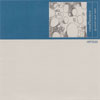 Intransitive Recordings has released one in a pair of discs by JohnGrznich and Seth Nehil that explores their prolonged colaboration ofthe last several years. 'Confluence' opens with an extended, airy droneand a slight whisper that leads into a repeated clanking rhythm thatgrows until another, deeper drone can supplant the first. Slowly,microorganisms made purely of sound begin to swell and collide as theopening piece, titled "Pneuma" in a vaguely scientific artspeak createsa self-sustaining colony of sounds as beings. Of course, thesound-organisms don't have to abide by the physical laws and socialrules that real beings would, and so the analogy ends there. ButGrznich and Nehil have set out to create organic sound systems with'Confluence' and the differentiation between an organic system and asymbol of one is important. The prose that fills the liner notes iscoldly detached as it describes processes, and experiments more thansounds and feelings. Of course, not all music is set to resonate on anemotional level, and "Pneuma" is a good example of that. You can findthe structures, observe the growth and be completely involved inlistening to the system, but it's not likely to affect you in apersonal, emotional way unless you are normally moved by the kind ofrigidly scientific approach to the world that this track seems toentail. "The Distant Edge," however, treads a very different terrainthat is full of voices and the aural signifiers of human activity. Theatonal choral drone that builds with the agitated activity of a beehiveis reminiscent of the György Ligeti themes in 2001, and is accompaniedby location recordings of crowd noise and honking car horns that evokethe confusion and dissonance of a demonstration in Belgrade. Thealbum's closer, "Lohme" is a fluttering, cyclic drone workout that seesa sonic system in stasis, wrapping around itself in a pulsatingwhitewash. "Lohme" lacks the tension of "The Distant Edge" and theclinical precision of "Pneuma," but works on it's own as a worthy forayinto musical structures that take an almost extreme amount of patienceand time to digest. From the pen and ink drawing on the cover to thelast fading tones of recorded tones, 'Confluence' is an observablesonic petri dish. Just like looking through a microscope at amorphousshapes colliding in the protoplasm, approaching this record can bedifficult and rewarding depending on what you expect to find.
Intransitive Recordings has released one in a pair of discs by JohnGrznich and Seth Nehil that explores their prolonged colaboration ofthe last several years. 'Confluence' opens with an extended, airy droneand a slight whisper that leads into a repeated clanking rhythm thatgrows until another, deeper drone can supplant the first. Slowly,microorganisms made purely of sound begin to swell and collide as theopening piece, titled "Pneuma" in a vaguely scientific artspeak createsa self-sustaining colony of sounds as beings. Of course, thesound-organisms don't have to abide by the physical laws and socialrules that real beings would, and so the analogy ends there. ButGrznich and Nehil have set out to create organic sound systems with'Confluence' and the differentiation between an organic system and asymbol of one is important. The prose that fills the liner notes iscoldly detached as it describes processes, and experiments more thansounds and feelings. Of course, not all music is set to resonate on anemotional level, and "Pneuma" is a good example of that. You can findthe structures, observe the growth and be completely involved inlistening to the system, but it's not likely to affect you in apersonal, emotional way unless you are normally moved by the kind ofrigidly scientific approach to the world that this track seems toentail. "The Distant Edge," however, treads a very different terrainthat is full of voices and the aural signifiers of human activity. Theatonal choral drone that builds with the agitated activity of a beehiveis reminiscent of the György Ligeti themes in 2001, and is accompaniedby location recordings of crowd noise and honking car horns that evokethe confusion and dissonance of a demonstration in Belgrade. Thealbum's closer, "Lohme" is a fluttering, cyclic drone workout that seesa sonic system in stasis, wrapping around itself in a pulsatingwhitewash. "Lohme" lacks the tension of "The Distant Edge" and theclinical precision of "Pneuma," but works on it's own as a worthy forayinto musical structures that take an almost extreme amount of patienceand time to digest. From the pen and ink drawing on the cover to thelast fading tones of recorded tones, 'Confluence' is an observablesonic petri dish. Just like looking through a microscope at amorphousshapes colliding in the protoplasm, approaching this record can bedifficult and rewarding depending on what you expect to find.Read More
- Administrator
- Albums and Singles
 Stray Light are the Manchester (UK) band I've enjoyed most in recentyears. After seeing their earliest gigs I invited them to support BardoPond and Stars of the Lid when I put on gigs for those bands. Theirdebt to Sonic Youth has always been apparent, but they play up a moremannered and thoughtful side of that influence than most detunedrockists. When they first started gigging around Manchester amongst asea of turgid Oasis clones they stood out a mile. Stray Light are allabout slowburning intertwined guitar melodies, bolstered by sweetviolin drone and skittering drums. 'Careers' consists mostly of finelywrought instrumentals which gleam elegantly, but it's a shame Kat Moordoesn't sing a little more as she can bring a heartfelt longing to hersemi-mumble singing that's quite stunning at times, and her duet withbassist / violinist Ellen Poliakoff on "Sarcasm On The Move" has astrange playground nursery rhyme feel that's both cute and sinister.Vocals don't force an entry until the fourth track, "Hearing Shapes,"which brings a buried folkiness to the byre. Whilst they open the albumwith all strings blazing in the psychedelic cloud swarms of the veryappropriately titled "Haze & Your Arm," mostly guitarists Kat andDavid Bennett pick careful arpeggiated flutter, swirling around in everdeepening pools, building carefully considered sunrise momentum. Whenthey do unleash a little six string fire, its always been carefullystoked. It seems rhythmic thrust is painted in by the guitar melodies,and Dan Dunbobbin's drumming tends to punctuate. The final track"Kitty's Blues" finds Kat describing pent up rage brilliantly in asparse lyric, "Every time you shut your eyes, you burst into flames,"and the album careers to a langourous anti-climax, cutting off aheartrending yearning elegy just as it seems about to explode.'Careers' follows up the CD-R release 'Mile 7' with similar shimmeringquality, but with perhaps more obvious contribution from their newestmember Ellen, whose violin has become ever more central to their sound.You can hear tracks at the Doubtful Sound website.
Stray Light are the Manchester (UK) band I've enjoyed most in recentyears. After seeing their earliest gigs I invited them to support BardoPond and Stars of the Lid when I put on gigs for those bands. Theirdebt to Sonic Youth has always been apparent, but they play up a moremannered and thoughtful side of that influence than most detunedrockists. When they first started gigging around Manchester amongst asea of turgid Oasis clones they stood out a mile. Stray Light are allabout slowburning intertwined guitar melodies, bolstered by sweetviolin drone and skittering drums. 'Careers' consists mostly of finelywrought instrumentals which gleam elegantly, but it's a shame Kat Moordoesn't sing a little more as she can bring a heartfelt longing to hersemi-mumble singing that's quite stunning at times, and her duet withbassist / violinist Ellen Poliakoff on "Sarcasm On The Move" has astrange playground nursery rhyme feel that's both cute and sinister.Vocals don't force an entry until the fourth track, "Hearing Shapes,"which brings a buried folkiness to the byre. Whilst they open the albumwith all strings blazing in the psychedelic cloud swarms of the veryappropriately titled "Haze & Your Arm," mostly guitarists Kat andDavid Bennett pick careful arpeggiated flutter, swirling around in everdeepening pools, building carefully considered sunrise momentum. Whenthey do unleash a little six string fire, its always been carefullystoked. It seems rhythmic thrust is painted in by the guitar melodies,and Dan Dunbobbin's drumming tends to punctuate. The final track"Kitty's Blues" finds Kat describing pent up rage brilliantly in asparse lyric, "Every time you shut your eyes, you burst into flames,"and the album careers to a langourous anti-climax, cutting off aheartrending yearning elegy just as it seems about to explode.'Careers' follows up the CD-R release 'Mile 7' with similar shimmeringquality, but with perhaps more obvious contribution from their newestmember Ellen, whose violin has become ever more central to their sound.You can hear tracks at the Doubtful Sound website. Read More
- Administrator
- Albums and Singles
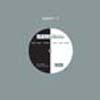 Swim releases are always worth a shot, so after being a bit surprised that Colin Newman was releasing a single by a band who sounded on the surface to be some kind of reversion to punk rock '77, I decided to try it anyway and see if it didn't grow in. This was a good idea, as I'd heard compressed radio broadcasts of Rhodes prior to hearing the single, and some of the raw powerhouse energy had been shorn away.
Swim releases are always worth a shot, so after being a bit surprised that Colin Newman was releasing a single by a band who sounded on the surface to be some kind of reversion to punk rock '77, I decided to try it anyway and see if it didn't grow in. This was a good idea, as I'd heard compressed radio broadcasts of Rhodes prior to hearing the single, and some of the raw powerhouse energy had been shorn away.
 
Colin's always been a big fan of process and this is why he liked Rhodes, a rock band born in a computer. He reckons that soon a lot more rock bands are going to be building tracks on computers from digitized building blocks, discrete chunks of recorded sound reconfigured furiously. Although this isn't nearly as distinctive as Wire's 'Read and Burn' EPs, it has a similar juggernaut crunch. "War Day" is a grimly appropriate a title for a song today, considering the idiotic destabilizing Middle Eastern situation, and the song rips, shreds and burns with a swagger not a million miles from the Saints second classic album 'Eternally Yours.' Despite a cocky attitude, the vocals are fairly weak and nondescript but that's not such a problem with a hotblooded ascending guitar riff driving the song to destruction. The computer also fuels ultraheavy crushing drum precision. On the flipside, 'The New' sounds like some long lost out-take from the Adverts first album, reshined and honed in widescreen moderninity. Rhodes deliver two quick blasts that leave me curious to see if they can transcend their influences when album time comes, because they've taken root in a killer sound bristling with needle-in-the-red digital distortion overload and it'd be a shame if something fresher didn't grow there.
Read More
- Diane Wei Lewis
- Albums and Singles
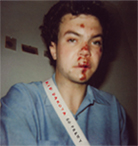 Originally self-released as a five-song EP in 2001, Kid Dakota's expanded version (his debut full-length) arrives with three new tracks on Low's Chairkickers Union Music. (Low's own Zak Sally even joins the Minneapolis duo on bass on several tracks.) For a two-man outfit—Christopher McGuire on percussion and Darren Johnson contributing vocals, guitar, and all other instruments—Kid Dakota is electric. Jackson's songwriting and unvarnished angst break forth with surprising ferocity given that most of his songs feature two- (or three- or four-) part vocal harmonies and languorous guitar solos.
Originally self-released as a five-song EP in 2001, Kid Dakota's expanded version (his debut full-length) arrives with three new tracks on Low's Chairkickers Union Music. (Low's own Zak Sally even joins the Minneapolis duo on bass on several tracks.) For a two-man outfit—Christopher McGuire on percussion and Darren Johnson contributing vocals, guitar, and all other instruments—Kid Dakota is electric. Jackson's songwriting and unvarnished angst break forth with surprising ferocity given that most of his songs feature two- (or three- or four-) part vocal harmonies and languorous guitar solos.
These decorative touches emerge like hard rock-inspired indulgences over otherwise straight-forward, sparse arrangements. It's as if you stripped the orchestra from the heavy metal power ballad, and then most of the heavy metal, but still found songs that were slightly glamorous, not a little trashy, perhaps even desperate, but definitely beautiful and raw. Jackson's voice, like that of an anemic angel, floats between humming guitars and sparkling cymbal crashes. Sweet, lazy, and clear, almost every trembling note is about pain. Lyrics touch on substance abuse and betrayal but inevitably return to the dull, debilitating conviction that one has become a cipher. Jackson, whose bloody face stares from the album cover in a candid snapshot from darker times, has said that while he is now completely sober, 'So Pretty' is a testament to the darkness of his worst years. But what great hooks! With several tracks actually waltzing into lilting crescendos, the music sustains humor and warmth if not hope throughout all sorts of miserable scenarios. Thus, although on the way there's a cheating girlfriend, getting dumped, alcoholism, heroin addiction, more alcoholism, meaningless sex, and murder—the last song, "The Overcoat," is emblematic of it all. Ending on a slightly higher note (detox), Jackson is still morbidly fatalistic ("maybe better but more likely it's worse") but even if nothing changes and even in the face of nothing itself, one has to keep moving: "And it's New Year's Eve / There's nothing to do there's nowhere to go / So I get a pass from my counselor to walk in the snow / Maybe going in circles again but it's hard to say / 'Cause my tracks keep filling up with snow and they fade away." 
 
Read More
- Administrator
- Albums and Singles
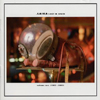 Only very few of my fave bands can usher me in a trance-like state tocompletely different worlds like Laika. After ten years of recording assuch, their first compilation has surfaced—collecting a number offavorites, rarities and unreleased things. While theobsessive/compulsive nitpicky side of me starts screaming bloody murderlooking for other rare omitted or forgotten tunes, the calm/collectedside of me is very thankful this came out. Thinking back to 1993, itwas obvious from the first Moonshake recordings that their strengthswere in the bass, female vocals and killer production. After releasingthe 'Eva Luna' LP and a couple EPs, the bassist, female singer andproducer broke free from Moonshake. (Unsurprisingly Moonshake's qualitysharply went downhill.) Guitarist/vocalist Margaret Fiedler, amid-westerner living in London and producer Guy Fixsen formed Laikawith other Moonshake alum, John Frenett on bass guitar. The debutalbum, 'Silver Apples of the Moon' surfaced in 1995 and further pushedthe best ideas put forth on 'Eva Luna,' deftly crashing the sounds ofadventurous rock and rhythmic mayhem. The dangerously catchy tunes weresaturated in electronic and organic percussion, whimsical loops,intoxicating repetitious bass guitar riffs and unoffensive vocals. Iremember seeing Tricky open for Laika on this tour and was simply wowedby their deceptive simplicity. Frenett departed, Rob Ellis joined andtheir second album, 'Sounds of the Satellites' came out in 1997. WithRob's departure, Laika became more clearly defined a duo between Guyand Margaret. 'Good Looking Blues,' released in 2000, was easily one ofmy faves of the year: their instrumentation became less and lesssaturated while the feel became more and more galactic. (Sometimes it'samazing how the simplest of instrumentations can create the mostcompelling songs.) All three albums are represented by some of theirband-picked highlights, while the bonus material includes non-albumtracks like "Lower Than Stars," originally recorded for a Volume comp,the brand new song, "Beestinger," three Peel Session recordings, theircover of Wire's "German Shepherds," and a couple remixes including JackDangers' epic 9+ minute extension of "Looking for the Jackalope."Originally recorded for the Red Hot compilaiton, 'Off-Beat,'"Jackalope" is one of my fave Dangers remixes, rhythmically laden withwhat sounds like baby rattles and entertaining samples of psychedelicnumerologists. Furthermore, an accompanying booklet has really coolstories and factual tidbits. For example: did you know singer/guitaristMargaret Fiedler has done more Peel Sessions for more bands than anyother woman? (This is due to her performances with Laika, Moonshake, PJHarvey and God is My Co-Pilot.) 'Lost in Space' is a two-disc set andis graciously priced only as a single and is worth every minute.
Only very few of my fave bands can usher me in a trance-like state tocompletely different worlds like Laika. After ten years of recording assuch, their first compilation has surfaced—collecting a number offavorites, rarities and unreleased things. While theobsessive/compulsive nitpicky side of me starts screaming bloody murderlooking for other rare omitted or forgotten tunes, the calm/collectedside of me is very thankful this came out. Thinking back to 1993, itwas obvious from the first Moonshake recordings that their strengthswere in the bass, female vocals and killer production. After releasingthe 'Eva Luna' LP and a couple EPs, the bassist, female singer andproducer broke free from Moonshake. (Unsurprisingly Moonshake's qualitysharply went downhill.) Guitarist/vocalist Margaret Fiedler, amid-westerner living in London and producer Guy Fixsen formed Laikawith other Moonshake alum, John Frenett on bass guitar. The debutalbum, 'Silver Apples of the Moon' surfaced in 1995 and further pushedthe best ideas put forth on 'Eva Luna,' deftly crashing the sounds ofadventurous rock and rhythmic mayhem. The dangerously catchy tunes weresaturated in electronic and organic percussion, whimsical loops,intoxicating repetitious bass guitar riffs and unoffensive vocals. Iremember seeing Tricky open for Laika on this tour and was simply wowedby their deceptive simplicity. Frenett departed, Rob Ellis joined andtheir second album, 'Sounds of the Satellites' came out in 1997. WithRob's departure, Laika became more clearly defined a duo between Guyand Margaret. 'Good Looking Blues,' released in 2000, was easily one ofmy faves of the year: their instrumentation became less and lesssaturated while the feel became more and more galactic. (Sometimes it'samazing how the simplest of instrumentations can create the mostcompelling songs.) All three albums are represented by some of theirband-picked highlights, while the bonus material includes non-albumtracks like "Lower Than Stars," originally recorded for a Volume comp,the brand new song, "Beestinger," three Peel Session recordings, theircover of Wire's "German Shepherds," and a couple remixes including JackDangers' epic 9+ minute extension of "Looking for the Jackalope."Originally recorded for the Red Hot compilaiton, 'Off-Beat,'"Jackalope" is one of my fave Dangers remixes, rhythmically laden withwhat sounds like baby rattles and entertaining samples of psychedelicnumerologists. Furthermore, an accompanying booklet has really coolstories and factual tidbits. For example: did you know singer/guitaristMargaret Fiedler has done more Peel Sessions for more bands than anyother woman? (This is due to her performances with Laika, Moonshake, PJHarvey and God is My Co-Pilot.) 'Lost in Space' is a two-disc set andis graciously priced only as a single and is worth every minute.Read More
- Michael Patrick Brady
- Albums and Singles
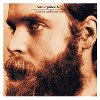 Will Oldham's third full-length release as Bonnie 'Prince' Billycontinues to develop the intimate, personal songwriting he's known for.The sparse, haunting tone of 'I See a Darkness' has given way to a muchwarmer, lush feel that began to emerge on 'Ease on Down the Road.'Billy's acoustic guitar is the center of the sound, and it comes acrosssoft, clear and resonant against his reedy voice. The album's opener"The Way" shows that in spite of the more comfortable musical feel ofthe album, Billy is still not content, with its opening line "Wintercomes and snow / I can't marry you, you know" and its string-backedchorus, "Love me the way I love you." The broken romance dominates thealbum. Bonnie Billy can be imagined sitting by a fire in a tiny woodencottage in some Southern backwater, rehashing the heartache and penningbitter lyrics like "Constancy and love is a joke / I'm not afraid ofmeeting you / I'm fickle and I brag about it / neither will I cry foryou." Perhaps the most stunning song is "Wolf Among Wolves" where Billymost closely approaches his past 'Darkness' ghostliness. In betweenoccasional ambient gusts, Billy intones, "Why can't I be loved as whatI am? / A wolf among wolves and not as a man / among men." At times,the album can drag, particularly with the repetitive chorus of "Joy andJubilee," but for the most part, Oldham's words and arraignments areenough to keep you interested. "Master and Everyone" fleshes outOldham's melancholy songwriting with the addition of female backupvocals and instrumentation like strings, winds, and accordion. Mostimportantly, they are not used needlessly or overbearingly, butsparingly and sound like a perfect fit for the quiet, folky atmosphere.Oldham has a knack for crafting soulful, emotional songs and 'Masterand Everyone' demonstrates that he's only getting stronger. -
Will Oldham's third full-length release as Bonnie 'Prince' Billycontinues to develop the intimate, personal songwriting he's known for.The sparse, haunting tone of 'I See a Darkness' has given way to a muchwarmer, lush feel that began to emerge on 'Ease on Down the Road.'Billy's acoustic guitar is the center of the sound, and it comes acrosssoft, clear and resonant against his reedy voice. The album's opener"The Way" shows that in spite of the more comfortable musical feel ofthe album, Billy is still not content, with its opening line "Wintercomes and snow / I can't marry you, you know" and its string-backedchorus, "Love me the way I love you." The broken romance dominates thealbum. Bonnie Billy can be imagined sitting by a fire in a tiny woodencottage in some Southern backwater, rehashing the heartache and penningbitter lyrics like "Constancy and love is a joke / I'm not afraid ofmeeting you / I'm fickle and I brag about it / neither will I cry foryou." Perhaps the most stunning song is "Wolf Among Wolves" where Billymost closely approaches his past 'Darkness' ghostliness. In betweenoccasional ambient gusts, Billy intones, "Why can't I be loved as whatI am? / A wolf among wolves and not as a man / among men." At times,the album can drag, particularly with the repetitive chorus of "Joy andJubilee," but for the most part, Oldham's words and arraignments areenough to keep you interested. "Master and Everyone" fleshes outOldham's melancholy songwriting with the addition of female backupvocals and instrumentation like strings, winds, and accordion. Mostimportantly, they are not used needlessly or overbearingly, butsparingly and sound like a perfect fit for the quiet, folky atmosphere.Oldham has a knack for crafting soulful, emotional songs and 'Masterand Everyone' demonstrates that he's only getting stronger. -Read More
- Administrator
- Albums and Singles
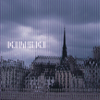 I'm now in my third year of hosting a regular "rock" show on a collegeradio station (I've been hosting various other experimental andnon-thematic shows since 1986 mind you), and I have been finding myselfincreasingly disgruntled with the current trends of "rock" music. Itseems that the best songwriters in bands who employ theguitar/bass/drums format play both very slowly and timidly, while theupbeat, more energetic stuff is mostly sloppy, painfully derivative,poorly written, or too damned wimpy. While an increasing amount ofnoisy, more experimental rock is feverishly exciting, none of it reallyfits in to the first radio show of the morning—the "morningdrive"—where I can provide a viable alternative to mall-rock and talkradio on the rest of the dial without getting too abrasive, weird ordepressing. Bearing that in mind, it is no wonder that I find Kinski'sthird album (their Sub Pop debut) a long overdue, much needed,refreshing break from the mundane. Nearly all of the songs areinstrumental, most stretch close to or over the ten minute mark, andall are fully developed with multiple movements and incorporateinfluences from a number of styles. It starts with the hum of a tone,and then another and another, patiently layering on top of each otheruntil the first guitar comes in, and just when the song appears to havereached its identity, BANG!, the -real- meat kicks in. Get used tobeing surprised. While this Seattle quartet has been seen spending timewith hippies and dronesters, thanks to performances at Terrastock andconcerts with other strange attractors, their sound is neitherintrospective nor headphonic, climaxing with enough noise to please theinner child and a rhythm strong and solid enough to get the wallsshaking to the beat. At times, there's a distorted wall of blurryguitar sound but nobody's gazing at their shoes. After the first twoinstrumental songs, bassist Lucy Atkinson takes to the microphone, withthe fast-paced, aggressive "Rhode Island Freakout," which could easilymake any Pixies fan cream their jeans. Add that to the echo-ladenopening/white noise distortion ending of the following "Schedule forUsing Pillows & Beanbags," the blissful drum-less gem, "I Think IBlew It," and the sitar-esque guitar sounds on "Your Lights Are (OutOr) Burning Badly," and Kinksi are clearly far from being a one-trickpony or easily classifiable. This album is gratifying enough with onlyeight songs that total nearly an hour. Remember their name: no doubt itwill be dropped much more in the coming years.
I'm now in my third year of hosting a regular "rock" show on a collegeradio station (I've been hosting various other experimental andnon-thematic shows since 1986 mind you), and I have been finding myselfincreasingly disgruntled with the current trends of "rock" music. Itseems that the best songwriters in bands who employ theguitar/bass/drums format play both very slowly and timidly, while theupbeat, more energetic stuff is mostly sloppy, painfully derivative,poorly written, or too damned wimpy. While an increasing amount ofnoisy, more experimental rock is feverishly exciting, none of it reallyfits in to the first radio show of the morning—the "morningdrive"—where I can provide a viable alternative to mall-rock and talkradio on the rest of the dial without getting too abrasive, weird ordepressing. Bearing that in mind, it is no wonder that I find Kinski'sthird album (their Sub Pop debut) a long overdue, much needed,refreshing break from the mundane. Nearly all of the songs areinstrumental, most stretch close to or over the ten minute mark, andall are fully developed with multiple movements and incorporateinfluences from a number of styles. It starts with the hum of a tone,and then another and another, patiently layering on top of each otheruntil the first guitar comes in, and just when the song appears to havereached its identity, BANG!, the -real- meat kicks in. Get used tobeing surprised. While this Seattle quartet has been seen spending timewith hippies and dronesters, thanks to performances at Terrastock andconcerts with other strange attractors, their sound is neitherintrospective nor headphonic, climaxing with enough noise to please theinner child and a rhythm strong and solid enough to get the wallsshaking to the beat. At times, there's a distorted wall of blurryguitar sound but nobody's gazing at their shoes. After the first twoinstrumental songs, bassist Lucy Atkinson takes to the microphone, withthe fast-paced, aggressive "Rhode Island Freakout," which could easilymake any Pixies fan cream their jeans. Add that to the echo-ladenopening/white noise distortion ending of the following "Schedule forUsing Pillows & Beanbags," the blissful drum-less gem, "I Think IBlew It," and the sitar-esque guitar sounds on "Your Lights Are (OutOr) Burning Badly," and Kinksi are clearly far from being a one-trickpony or easily classifiable. This album is gratifying enough with onlyeight songs that total nearly an hour. Remember their name: no doubt itwill be dropped much more in the coming years.Read More
- Administrator
- Albums and Singles
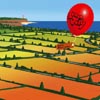 Admittedly, I do buy my share of soft, white, fluffy stuff. It's calledtoilet paper. While the duo of Nick Franglen and Fred Deakin haveproven themselves to be fantastic producers, none of the songs on theirfirst proper album seem to go anywhere. At times, the instrumentationcan be impressive and well-balanced, but other times it can be klutzyand oversaturated. In all examples, however, the melodies simply don'tchange for the nearly eight minutes of each track. What works is whencrystalline acoustic guitar riffs, piano melodies, and string soundsare finley matched with subtle breaks. This trend is established fromthe first few seconds of the album and thankfully continues for most ofthe first part of the disc. However, quite often the songs becomeburied in too many layers, consisting of the painfully British sound ofmuted brass instruments, tacky scratches and irritating vocal samples.For example: while the flute and bass guitar on "Ramblin' Man" arebecoming blissfully intoxicating, the obnoxious British twit listingoff cities forces me to hit the "next" button on the CD player. Matchthat with the obvious American influenced sounds of pedal steel guitarand harmonica and it's almost as if Lemon Jelly are suffering from anidentity crisis. Ironically, and this is in their favor, each song doeshave a clear identity and I never get the feeling that I've listened tothe same song eight times. I admit the guilt of having, "All the Ducksare Swimming in the Water" running in my head over and over again, andthe black-and-white horror film score feel of "Experiement No. 6" isfun too, but oversaturating a song with instruments and not changingthe melody doesn't change make for a listen worthy of repeating.
Admittedly, I do buy my share of soft, white, fluffy stuff. It's calledtoilet paper. While the duo of Nick Franglen and Fred Deakin haveproven themselves to be fantastic producers, none of the songs on theirfirst proper album seem to go anywhere. At times, the instrumentationcan be impressive and well-balanced, but other times it can be klutzyand oversaturated. In all examples, however, the melodies simply don'tchange for the nearly eight minutes of each track. What works is whencrystalline acoustic guitar riffs, piano melodies, and string soundsare finley matched with subtle breaks. This trend is established fromthe first few seconds of the album and thankfully continues for most ofthe first part of the disc. However, quite often the songs becomeburied in too many layers, consisting of the painfully British sound ofmuted brass instruments, tacky scratches and irritating vocal samples.For example: while the flute and bass guitar on "Ramblin' Man" arebecoming blissfully intoxicating, the obnoxious British twit listingoff cities forces me to hit the "next" button on the CD player. Matchthat with the obvious American influenced sounds of pedal steel guitarand harmonica and it's almost as if Lemon Jelly are suffering from anidentity crisis. Ironically, and this is in their favor, each song doeshave a clear identity and I never get the feeling that I've listened tothe same song eight times. I admit the guilt of having, "All the Ducksare Swimming in the Water" running in my head over and over again, andthe black-and-white horror film score feel of "Experiement No. 6" isfun too, but oversaturating a song with instruments and not changingthe melody doesn't change make for a listen worthy of repeating. Read More
- Administrator
- Albums and Singles
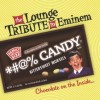 It seems like every week a new tribute album comes out where artistsfrom another genre show homage to bands that they've enjoyed or beeninfluenced by. This is not one of those albums. The Lounge Brigade, forno apparent reason other than the pure comedic value, have taken someof Eminem's more popular numbers and made them lounge. And although itseemed incredibly unlikely to me, the results are not all bad. To behonest, I'm not a big fan of Eminem, though I will admit he has animpressive delivery. The Lounge Brigade doesn't even try to keep up,and it's one of the only entertaining things about this release. On"Without Me," Tony Calzone, the band leader, tries to welcome us to theshow, and he's butted out of the way by another vocalist delivering araspy dismissal in true Marshall Mathers style. Then he flubs half ofthe lyrics or outright changes them as he clears his throat repeatedly.This is not a big band, as just four members handle keyboards, guitars,percussion, bass, and the occasional trumpet. The Brigade tries to makeup for their roster shortcomings, though, with unique arrangements."Stan," the track based on a horrible Dido song called "Thank You," isamped up into a Salsa number where the vocalists take a rest. The Didopart is replaced with horns, and piano picks up Em's lines, saving usfrom more lackluster performance by the vocalists, but that's the onlyplus. The one song where the delivery is close to the original, andtherefore something of a standout, is "My Name Is," where the vocalistcomes across like Steve Lawrence, even providing a corny "verse two"introduction. There's even an original composition called "Loungin'With Stan," but even that can't save this release from what doomed itall along. Why remake Eminem as lounge? Even if it is just for thecomedy of it, it's not that funny, and it's a one-note joke.
It seems like every week a new tribute album comes out where artistsfrom another genre show homage to bands that they've enjoyed or beeninfluenced by. This is not one of those albums. The Lounge Brigade, forno apparent reason other than the pure comedic value, have taken someof Eminem's more popular numbers and made them lounge. And although itseemed incredibly unlikely to me, the results are not all bad. To behonest, I'm not a big fan of Eminem, though I will admit he has animpressive delivery. The Lounge Brigade doesn't even try to keep up,and it's one of the only entertaining things about this release. On"Without Me," Tony Calzone, the band leader, tries to welcome us to theshow, and he's butted out of the way by another vocalist delivering araspy dismissal in true Marshall Mathers style. Then he flubs half ofthe lyrics or outright changes them as he clears his throat repeatedly.This is not a big band, as just four members handle keyboards, guitars,percussion, bass, and the occasional trumpet. The Brigade tries to makeup for their roster shortcomings, though, with unique arrangements."Stan," the track based on a horrible Dido song called "Thank You," isamped up into a Salsa number where the vocalists take a rest. The Didopart is replaced with horns, and piano picks up Em's lines, saving usfrom more lackluster performance by the vocalists, but that's the onlyplus. The one song where the delivery is close to the original, andtherefore something of a standout, is "My Name Is," where the vocalistcomes across like Steve Lawrence, even providing a corny "verse two"introduction. There's even an original composition called "Loungin'With Stan," but even that can't save this release from what doomed itall along. Why remake Eminem as lounge? Even if it is just for thecomedy of it, it's not that funny, and it's a one-note joke. Read More
- Administrator
- Albums and Singles
 Another theme/concept record from Bip-Hop is Tonne's 'Soundtoy,' whichis effectively a product demo for a sound sequencing device that Tonnecreated as an alternative to the big budget, feature-laden audiopackages that drive modern electronic music production. The Soundtoyapplication is included on this disc for listeners to try out, and itallows the user to drag and drop colored squares that represent a bankof sixteen sounds onto a grid of twelve moving lines. Like the boardgame Othello, Soundtoy takes a minute to learn but a lifetime tomaster. The interface is intuitive and even fun to play with, but asthere is no quantization feature and no way to record your drags anddrops for playback at a later time, getting something you really wantout of it is another story. But creating whole tracks, like the eightsongs also included on this disc, does not apper to be the real aim ofSoundtoy. Instead, the artists involved primarily used the applicationto come up with new rhythmic combinations that a rigid sequencingprogram might not have helped to produce. Scanner, Si-cut.db, HakanLidbo, and Tonne himself each contribute two tracks a piece of noodlyelectronic tones drenched in reverb and delay, and after listening tothe album straight through three times in a row it was very difficultto pinpoint any one artist's signature sound or contribution. Expect alot of click n cut style percussion stabs, warm sampled bits fromanalog keyboards, and structures that flirt with the idea of beats butdon't usually manage much more than fractured, off-time rhythms. Theincluded sound files from the artists involved should keep bedroomlaptoppers busy hacking and remixing for a while, and the musicincluded, while not a necessary advancement in the world of computermusic, is fresh enough to earn a spot in the rotation at your favoritechill out spot.
Another theme/concept record from Bip-Hop is Tonne's 'Soundtoy,' whichis effectively a product demo for a sound sequencing device that Tonnecreated as an alternative to the big budget, feature-laden audiopackages that drive modern electronic music production. The Soundtoyapplication is included on this disc for listeners to try out, and itallows the user to drag and drop colored squares that represent a bankof sixteen sounds onto a grid of twelve moving lines. Like the boardgame Othello, Soundtoy takes a minute to learn but a lifetime tomaster. The interface is intuitive and even fun to play with, but asthere is no quantization feature and no way to record your drags anddrops for playback at a later time, getting something you really wantout of it is another story. But creating whole tracks, like the eightsongs also included on this disc, does not apper to be the real aim ofSoundtoy. Instead, the artists involved primarily used the applicationto come up with new rhythmic combinations that a rigid sequencingprogram might not have helped to produce. Scanner, Si-cut.db, HakanLidbo, and Tonne himself each contribute two tracks a piece of noodlyelectronic tones drenched in reverb and delay, and after listening tothe album straight through three times in a row it was very difficultto pinpoint any one artist's signature sound or contribution. Expect alot of click n cut style percussion stabs, warm sampled bits fromanalog keyboards, and structures that flirt with the idea of beats butdon't usually manage much more than fractured, off-time rhythms. Theincluded sound files from the artists involved should keep bedroomlaptoppers busy hacking and remixing for a while, and the musicincluded, while not a necessary advancement in the world of computermusic, is fresh enough to earn a spot in the rotation at your favoritechill out spot.- Scanner - Guide Me By Surprise
- Si-Cut.db - Rosalind
- Tonne - Minesou
Read More

